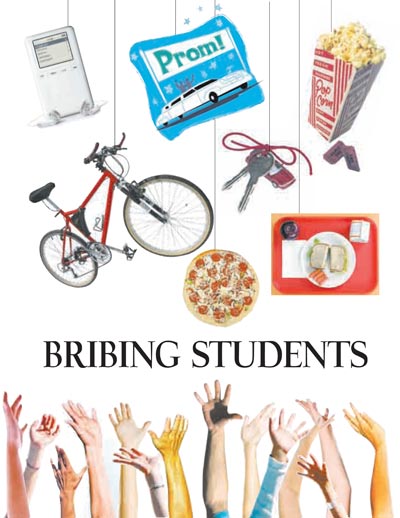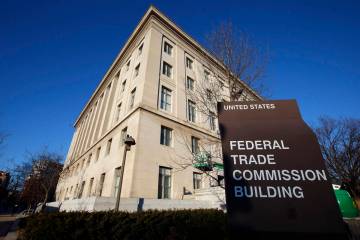BRIBING STUDENTS
Shiny trophies, satin ribbons and pats on the back for perfect attendance are out.
Instead, today's Clark County School District students might receive a bicycle, an iPod or movie tickets as performance rewards.
The federal No Child Left Behind Act pressures schools to show high student attendance rates, but school board members wonder if the incentives are getting out of hand.
"We shouldn't have to bribe kids to come to school," said Clark County School Board Member Terri Janison during a recent board meeting.
She's concerned that high-end rewards are adding to "this generation's sense of entitlement."
School Board Member Ruth Johnson said she's not "opposed to a bicycle raffle" but is against using instruction time and school money for such frills.
District staff said the prizes are funded through community donations and student-generated fees, such as vending machine revenues, and not by taxpayer dollars.
Many of the rewards are also inexpensive or school-related, such as first-in-line lunch passes, free yearbooks or tickets to the prom.
Clark County is hardly alone in the incentives-for-attendance craze, noted Janison: It's "happening across the country."
Janison's assertion is supported by stories published in the Chicago Tribune and the Tennessean in Nashville. Both newspapers have featured school districts that rewarded students for attendance with new cars.
Under No Child Left Behind, a school's attendance record is one of the benchmarks used for judging whether a school is performing adequately or failing.
One of the flaws of the federal law is that it places so much of the responsibility for education on the system, Clark County school officials said.
Students and parents have lost a "sense of personal responsibility," Janison said.
Schools are also under pressure at the state level.
At the Legislature's request, Clark County public schools reported on their strategies for reducing truancy.
Schools were found to reward good behavior with incentives including pizza parties, random drawings for prizes or a stunt by a school administrator, such as kissing a pig or sitting on top of the school roof in a rocking chair.
In a follow-up to the Legislature, School Board members said they would clarify that they are not endorsing attendance rewards that use school funds.
Johnson offered a suggestion of her own for keeping students off the streets and in school. She would like to see school buses advertise a telephone number the public could use to report truants.
Jeff Horn, principal of Green Valley High School, said the best way to get students to come to class is to get them involved in activities such as sports, music or theater.
Statistics show that some students remain out of reach, despite the best efforts of school staff and officials.
In 2007-08, there were 2,556 citations for habitual truancy, about half of which were dismissed, while the other half were referred to truancy court.
Bench warrants were issued for 526 kids who did not show up to court.
To help habitual truants, the district's School Attendance Council has proposed a diversion program to start this year at Desert Pines High School.
Habitual offenders will meet with a counselor, do community service and take seven mandatory classes on Saturday mornings over a nine-week period. The classes will cover topics such as drugs, gangs, conflict resolution, communication and attitude.
Edward Goldman, associate superintendent for educational services, said many students with truancy problems may have parents in jail or are living with family friends or relatives.
"It's really sad," Goldman said.
Contact reporter James Haug at jhaug@reviewjournal.com or 702-799-2922.




























